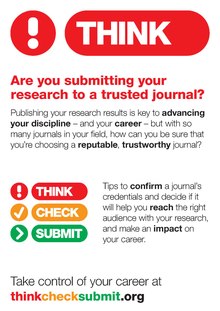
Back نشر استغلالي Arabic Predátorské publikování a predátorské konference Czech Røvertidsskrift Danish Predatory Publishing German Revista depredadora Spanish انتشارات متن باز مجرمانه Persian Revue prédatrice French כתב עת טורף HE Penerbit pemangsa ID Pubblicazione predatoria Italian

Predatory publishing, also write-only publishing[1][2] or deceptive publishing,[3] is an exploitative academic publishing business model that involves charging publication fees to authors while only superficially checking articles for quality and legitimacy, and without providing editorial and publishing services that legitimate academic journals provide, whether open access or not. The rejection rate of predatory journals is low, but seldom zero. The phenomenon of "open access predatory publishers" was first noticed by Jeffrey Beall, when he described "publishers that are ready to publish any article for payment".[4] However, criticisms about the label "predatory" have been raised.[5] A lengthy review of the controversy started by Beall appears in The Journal of Academic Librarianship.[6]
Predatory publishers are so regarded because scholars are tricked into publishing with them, although some authors may be aware that the journal is poor quality or even fraudulent but publish in them anyway.[a] New scholars from developing countries are said to be especially at risk of being misled by predatory publishers.[8][9][10] According to one study, 60% of articles published in predatory journals receive no citations over the five-year period following publication.[11][12]
Beall's List, a report that for five years was regularly updated by Jeffrey Beall of the University of Colorado until January 2017,[13][b] set forth criteria for categorizing publications as predatory.[14] A demand by Frontiers Media to open a misconduct case against Beall, which was launched by his university and later closed with no findings, was one of several reasons Beall may have taken his list offline, but he has not publicly shared his reasoning.[13][15] After the closure, other efforts to identify predatory publishing have sprouted, such as the paywalled Cabell's blacklist,[16] as well as other lists (some based on the original listing by Beall).
- ^ Bogost, Ian (24 November 2008). "Write-Only Publication".
- ^ Riehle, Dirk (13 September 2011). "Definition of Write-Only Journal".
- ^ Anderson, Rick (19 March 2019). "OSI Brief: Deceptive publishing".
- ^ Beall, Jeffrey (2012). "Predatory publishers are corrupting open access". Nature. 489 (7415): 179. Bibcode:2012Natur.489..179B. doi:10.1038/489179a. PMID 22972258. S2CID 659746.
- ^ Björk, Bo-Christer; Solomon, David (2012). "Open access versus subscription journals: A comparison of scientific impact". BMC Medicine. 10: 73. doi:10.1186/1741-7015-10-73. PMC 3398850. PMID 22805105.
- ^ Krawczyk, Franciszek; Kulczycki, Emanuel (2021). "How is open access accused of being predatory? The impact of Beall's lists of predatory journals on academic publishing". The Journal of Academic Librarianship. 47 (2): 102271. doi:10.1016/j.acalib.2020.102271. S2CID 228863095.
- ^ Kolata, Gina (30 October 2017). "Many Academics Are Eager to Publish in Worthless Journals" Archived 5 November 2017 at the Wayback Machine, The New York Times.
- ^ Kearney, Margaret H. (2015). "Predatory Publishing: What Authors Need to Know". Research in Nursing & Health. 38 (1): 1–3. doi:10.1002/nur.21640. PMID 25545343.
- ^ Xia, Jingfeng; Harmon, Jennifer L.; Connolly, Kevin G.; Donnelly, Ryan M.; Anderson, Mary R.; Howard, Heather A. (2014). "Who publishes in "predatory" journals?". Journal of the Association for Information Science and Technology. 66 (7): 1406–1417. doi:10.1002/asi.23265. hdl:1805/9740. S2CID 40929915.
- ^ Cite error: The named reference
whykurtwas invoked but never defined (see the help page). - ^ Brainard J (2020). "Articles in 'predatory' journals receive few or no citations". Science. 367 (6474): 129. Bibcode:2020Sci...367..129B. doi:10.1126/science.aba8116. PMID 31919198. S2CID 241194758.
- ^ Björk, Bo-Christer; Kanto-Karvonen, Sari; Harviainen, J. Tuomas (2020). "How Frequently are Articles in Predatory Open Access Journals Cited". Publications. 8 (2): 17. arXiv:1912.10228. doi:10.3390/publications8020017. S2CID 209444511.
- ^ a b Silver, Andrew (18 January 2017). "Controversial website that lists 'predatory' publishers shuts down". Nature. doi:10.1038/nature.2017.21328. S2CID 157913572.
- ^ Elliott, Carl (5 June 2012). "On Predatory Publishers: a Q&A With Jeffrey Beall". Brainstorm. The Chronicle of Higher Education. Archived from the original on 8 February 2014.
- ^ Basken, Paul (12 September 2017). "Why Beall's List Died — and What It Left Unresolved About Open Access". The Chronicle of Higher Education. Retrieved 29 August 2020.
- ^ Cite error: The named reference
maysilverwas invoked but never defined (see the help page).
Cite error: There are <ref group=lower-alpha> tags or {{efn}} templates on this page, but the references will not show without a {{reflist|group=lower-alpha}} template or {{notelist}} template (see the help page).